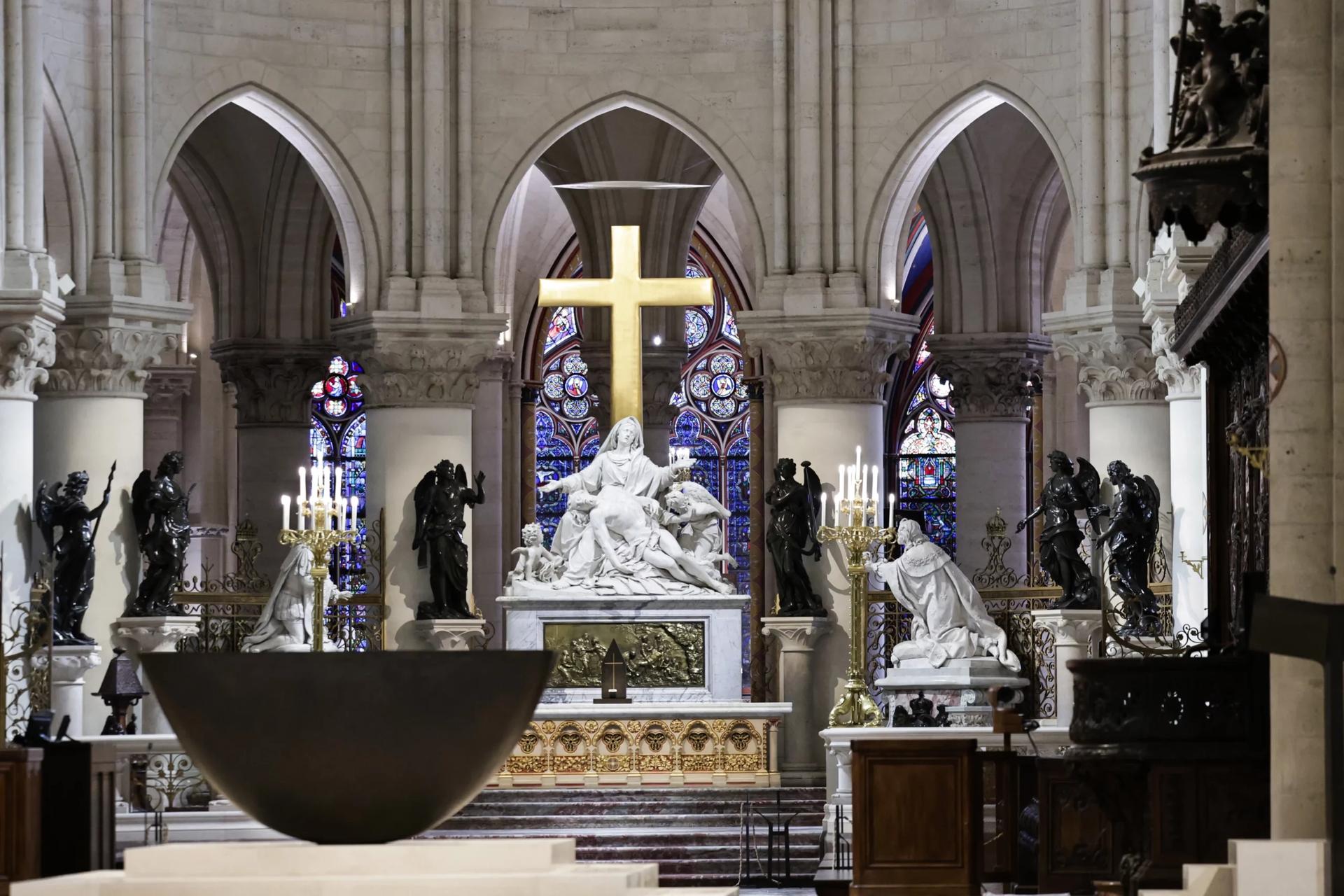ROME – After hosting the summer Olympics earlier this year, France this weekend will mark one of the most significant events of the century with the reopening of its famed Notre Dame Cathedral, five years after vast portions were destroyed in a fire.
However, while the inaugural Mass has a high-profile lineup that includes some 50 heads of state and government, including French President Emmanuel Macron and Donald Trump from the United States, one notable absentee will be Pope Francis, who declined the invitation but is traveling to a small, Mediterranean French island days later.
Notre Dame, an iconic 860-year-old French landmark not only for Catholics, but for locals and tourists from around the world, was engulfed in flames on April 15, 2019, with the blaze destroying vast portions of one of Europe’s most beloved cathedrals.
The cause of the fire is still a mystery but has been attributed to potentially a cigarette or an electrical malfunction.
In the wake of the incident, Macron outlined an ambition restoration plan, pledging to restore and reopen the cathedral within five years, a plan that drew the support of some of France’s wealthiest businessmen.
Over the past five years, 2,000 people, 2,000 oak trees, and 2,000 days’ work have resulted in the rebuilding and restoration of 2,000 features of the cathedral, according to CNN.
The official inauguration will kick off with a ceremony on Saturday evening and an inaugural Mass Sunday morning, followed by eight days of special Masses and prayers to mark the occasion.
Some 170 bishops from throughout France and around the world will also attend the ceremony, along with one priest from each of the 106 parishes in the Paris archdiocese.
While high-profile guests attending the initial inaugural Mass will include Macron and Trump, as well as heads of state and government from 50 countries, Pope Francis will notably be absent.
Instead, Francis, who snubbed his invite for the Dec. 8 Mass, which falls on the Catholic solemnity of the Immaculate Conception, will travel to France a few days later to visit the Mediterranean island of Corsica, which is currently embroiled in a dispute with the French government over its autonomy.
While in the island’s capital city of Ajaccio, the pope will close a conference on popular devotion in the Mediterranean, and presumably deliver a message to the people of the region, one that has been a key priority since the beginning of his papacy in 2013.
Pope Francis’s apparent snub of Macron comes as the French president faces mounting political problems as his government falls apart.
After facing significant losses during EU parliamentary elections over the summer, this week French Prime Minister Michel Barnier resigned following a no-confidence vote in parliament. French MPs voted overwhelmingly to remove Barnier Wednesday, just three months after his appointment by Macron.
Wednesday’s vote marked the first time a French government had been voted down by parliament in more than 60 years.
In the wake of the tumult, Macron said he himself will not resign and has pledged to name a new Prime Minister “in the coming days,” though finding one that will not immediately be voted out could prove to be a challenge.
Macron has also faced significant backlash from French and European bishops and the broader Catholic community after enshrining abortion into the country’s constitution earlier this year, and for an apparent drag parody of Da Vinci’s famed “Last Supper” during the opening ceremony for the Paris summer Olympics.
That parody drew widespread backlash from the international community and from various religious groups, including a condemnation from Pope Francis and from prominent Jewish and Muslim leaders, among others.
One French archbishop attempting to explain the pope’s absence from the Notre Dame inaugural Mass said the cathedral itself was the “star” of the ceremony, and Francis did not want to take attention away from that, preferring, as he has consistently done, to give attention to the peripheries, rather than traditional centers of power.
However, despite reassurances from local church hierarchy, it is difficult to interpret the pope’s absence from the Notre Dame inaugural Mass and his presence just a few days later on an island fighting for territorial autonomy as entirely without subtext.
This weekend’s events will kick off with a speech from Macron at Notre Dame, 6p.m. local time Saturday, after which Paris Archbishop Laurent Ulrich will strike the closed cathedral doors three times with his crozier, his bishops’ staff.
The cathedral will “respond” to the knocking with the singing of Psalm 121 three times, and after this, the doors will be opened.
Once the doors are open, there will be an “awakening” of the great organ, the largest in France with 8,000 pipes and 115 stops. Afterward a “chanting of the office” will occur, in which various psalms and prayers are sung, before Ulrich offers a final blessing and the signing of the traditional Latin hymn, the Te Deum.
Sunday’s inaugural Mass will be held at 10:30 a.m. local time, during which Ulrich will bless holy water and sprinkle it over the congregation and the altar. Readings for the Mass will be those of the Second Sunday of Advent.
Later that day, an evening Mass will be held that is open to the public. For an octave after the inauguration, meaning a period of eight days, Mass will be held twice daily and several special evening ceremonies will be held, many of which are open to the public.
On Dec. 17 and 18, Notre Dame will host concerts of Johann Sebastian Bach’s “Magnificat.”
An estimated 15 million visitors are expected to come to Notre Dame annually, admission is currently free. Those who wish to visit the cathedral can book tickets online.
Follow Elise Ann Allen on X: @eliseannallen














